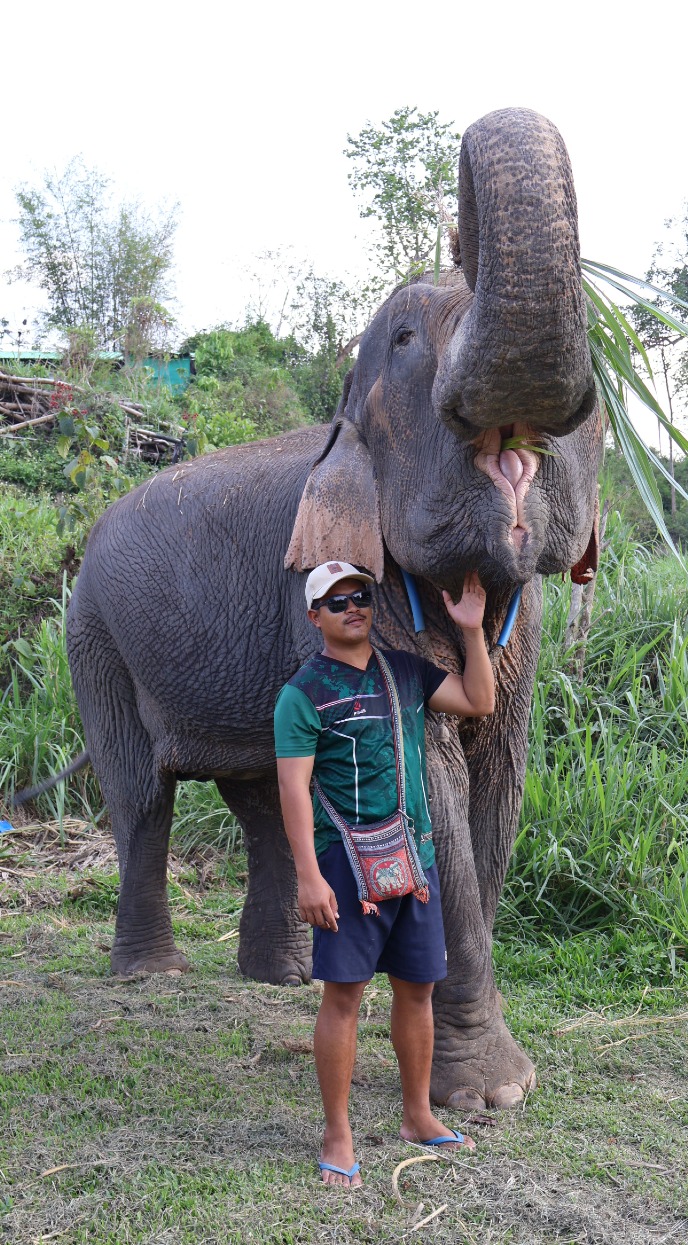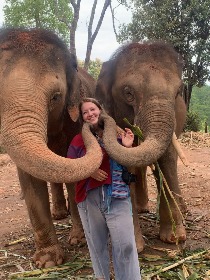Rethinking Elephant Tourism in Thailand: Rada’s Thesis Journey

Sustainable tourism is more than a buzzword: it is about balancing cultural preservation, environmental responsibility, and the well-being of local communities. In this post, Rada, a recent graduate of the MSc in Cultural Geography, track Sustainable Tourism & Society, shares her journey exploring elephant tourism in Thailand. From fieldwork in Chiang Mai to understanding the perspectives of the Karen hill tribe, she highlights the complexities of sustainable tourism, the challenges of cultural dissonance, and the importance of considering local voices when shaping ethical travel practices. Buckle up for a virtual trip to the other side of the world!
Can you tell us a bit about yourself and what led you to pursue the Master’s in Sustainable Tourism & Society? What sparked your interest in sustainable tourism in the first place?
Of course! I am Rada, from the Netherlands, and I have just graduated with a Master’s degree in Sustainable Tourism and Society. Since I was a child, I have traveled to many places in Southeast Asia, and it has become one of my greatest passions. However, despite having seen many beautiful places, I have also been at locations which raised questions about the fairness and downsides of tourism, such as over-tourism affecting the lives of locals, or how the difference in currencies influences inequalities in travel affordability.
Such moments made me very interested in sustainable tourism and to learn more about this field. But I actually did not know about this master's until my bachelor’s thesis supervisor recommended it to me. My topic back then was also related to animal tourism, and she saw potential and suggested that I could build on it with this master's. Then, when I read more about it, it really sparked my interest and felt it suited my personality.

Your thesis focuses on elephant tourism in Thailand. Can you tell us a bit more about it?
I am very passionate about animals, and when combined with my interest in traveling, it made me interested in exploring animal tourism. During my travels, I have encountered different forms of elephant tourism and observed how they have changed over time. I learned that these changes were often driven by tourist demands and other external actors, often from Western countries, who raised concerns about elephant welfare.
But this made me wonder how locals themselves perceive elephant tourism and what their underlying motivations are. The local perspective is often missing from the news and academic literature, and I find it hard to imagine that people would hurt animals intentionally. This, together with what I learned about cultural dissonance in this master's, in which outsiders' expectations and idealizations often do not match the reality of the locals, inspired me to focus on the locals' perspective on elephant tourism and answer the question of how Thai societal dynamics shape the development of elephant tourism.
❝I learned that these changes [in elephant tourism] were often driven by tourist demands and other external actors, often from Western countries, who raised concerns about elephant welfare.❞
How did you organize and gather your data?
I chose to conduct my fieldwork in Chiang Mai province in Northern Thailand, as the region is known for its cultural richness and is considered the national hub for elephant tourism in Thailand, hosting more than 90 elephant camps. I booked a return ticket and stayed in the city center for two months, during which I reached out to various stakeholders through email, posts on Facebook pages, and personal connections I made.
Eventually, I had a great diversity in participants, ranging from founders of elephant camps and elephant keepers to a veterinarian specialized in captive elephants, and local citizens who are not directly involved with elephants in their daily lives. The 14 participants were all Thai, but important to mention that half of them identified themselves as the Karen hill tribe, which is known for its unique coexistence with elephants for many generations.
What were your key findings?
The first important finding was the difference between the elephant as a cultural symbol and the elephant as a living animal in Chiang Mai province. As a symbol, the elephant is deeply embedded in the Thai culture, strongly tied to Buddhism, national history, and royalty. As an animal, the elephant is only very important for the Karen hill tribes, who view their elephants as best friends or family members, similar to the way others might have with their dog or cat.
However, due to extensive deforestation and changes in Thai law, it became difficult for the Karen to keep their elephants. And that is why elephant tourism emerged as a strategy to preserve their culture and coexistence with elephants. Nevertheless, outsiders, those not belonging to the Karen, saw this start of elephant tourism as a business opportunity. They established elephant camps as well, but often without the cultural, ecological, and elephant knowledge the Karen possess. According to the veterinarian I interviewed, the elephant welfare issues are therefore more likely to occur in these business-oriented camps.
❝Due to extensive deforestation and changes in Thai law, it became difficult for the Karen to keep their elephants. And that is why elephant tourism emerged as a strategy to preserve their culture and coexistence with elephants. Nevertheless, outsiders, those not belonging to the Karen, saw this start of elephant tourism as a business opportunity.❞
Another important finding is that tourists, mainly Western visitors, are the only source of income for elephant camps, which makes marketing play an important role. While the Karen-run camps generally aim to share their cultural heritage and present the realities of elephant care, the business-oriented camps often adapt to the Western idealizations, which do not align with the local realities (the cultural dissonance). In their marketing, some camps deny the use of certain tools or adjust their practices to meet Western expectations, often at the expense of the safety and welfare of their elephants, elephant keepers, and even the tourists themselves.
The misconceptions often relate to why elephants are kept in captivity, the use of chains, elephant keepers carrying a type of knives, and the broader cultural differences between Western and Asian perspectives. Tourists also tend to criticize the type of interactions offered at the camps, as is also processed in the marketing, ranging from observation only to riding, to bathing, to feeding, etc. The veterinarian I interviewed mentioned that all these types of interaction can be acceptable for the welfare of the elephant; what truly matters are factors such as hygiene, nutrition, social interaction with other elephants, resting times, etc, of which none can be measured within the one or two-hour visit of tourists. For the Karen hill tribe, it is difficult to compete with these perceptions due to language barriers, their marginalization within Thai society, differences in educational background, and limited experience with media and marketing.
What were the biggest challenges you encountered?
My biggest challenge was seeing the frustration and pain of members of the Karen community when they explained how some tourists criticize them and their unique culture. Their daily lives are being affected by outsiders, mainly Westerners, who believe they know better, despite only spending two or three hours at an elephant camp and having little understanding of what happens behind the scenes. And since their income to live and preserve their culture depends on these tourists, it places them in a vulnerable position. So the emotions getting involved were difficult, but at the same time, extra motivating to amplify their voices.
Besides that, a more practical challenge was the language barrier, as I do not speak Thai or Karen. About half of the people I interviewed spoke English, but the other half were Karen participants with whom I did not share a common language. But because their perspective was very important to this research, I luckily found a translator who helped me communicate with them. This also required some patience, especially since some words could not be literally translated. But also, some cultural differences played a role, since it is normal for them to leave shortly, take phone calls, and start dinner during ongoing conversations, haha. But the effort it cost was definitely worth it!
Did your perspective on elephant tourism change as a result of your research/did anything in your findings surprise you?
Absolutely! Even though I have been curious about the local perspectives on the different animal tourisms that I have encountered, my opinion was still shaped by the animal welfare concerns I have been mainly exposed to. And yes, those concerns are crucial, but I learned that there is so much more to consider, such as the preservation of Karen culture and the safety and livelihood of the elephant keepers.
It taught me that Western norms and values around animal tourism cannot be simply applied to other cultural contexts. We have to remain open and respectful towards the norms of different cultures. As mentioned before, some elephant camps decide to use these misconceptions in their marketing, which Western tourists, myself included, can easily fall for. Since tourists play such a crucial role in shaping the future of elephant tourism in Thailand, it is important to approach it with open-mindedness, cultural respect, and a willingness to understand the realities behind these practices, rather than relying on outsider assumptions.
❝It taught me that Western norms and values around animal tourism cannot be simply applied to other cultural contexts. We have to remain open and respectful towards the norms of different cultures.❞
How do you think your work contributes to the field of sustainable tourism?
I think, as I learned during my master’s, that this highlights the complexity of the concept of sustainability and introduces a new approach in the field of animal tourism.
Sustainable animal tourism is not only about animal welfare, but it encompasses much more than that! In this case, it means embracing different cultural values in which human-animal relationships are rooted, ensuring the safety and health of the elephant keepers, fostering equal power dynamics, considering how practices adapt to environmental changes and legal frameworks, and recognizing the dependence of these systems on tourists.
How has this experience shaped your future ambitions or career plans?
It was such a meaningful experience for me that it has given me both motivation and inspiration to pursue further research on the misperceptions Westerners often have about elephant tourism, other forms of animal tourism, and cultural norms more broadly.
At the same time, because this perspective is a new approach to elephant tourism, it is not yet very accessible, and tourists often cannot know better yet when deciding, for instance, which elephant camp to visit. So somehow, I would also like to contribute to building better understanding, awareness, and education around cultural differences, while also raising the voices of the local communities. I am not entirely sure how yet, but the experience gave me so many ideas, such as continuing academic research and creating informative platforms. Or one day, I hope to actively participate in community projects related to animal tourism and/or overlooked ethnic minorities. In doing so, I hope to contribute to making the world a little more sustainable.
Interested in the programme?
Subscribe to the monthly newsletter to stay up to date with events, deadlines, and programme-related content!
About the author

Rada Middelhoek is a graduate of the Master's in Cultural Geography, track Sustainable Tourism & Society, offered at Campus Fryslân, University of Groningen.

